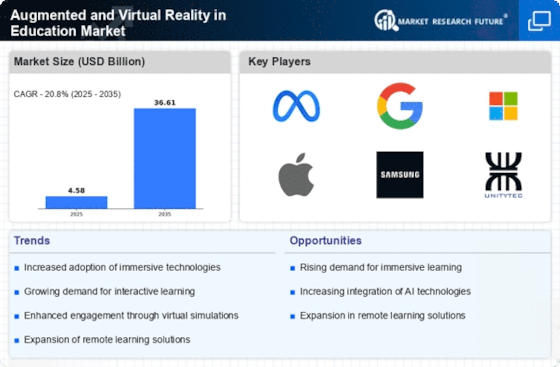Top Industry Leaders in the AR VR in Education Market
Competitive Landscape of Augmented and Virtual Reality in Education Market:
The education sector is on the cusp of a revolution with the burgeoning adoption of Augmented Reality (AR) and Virtual Reality (VR) technologies. This immersive learning medium boasts the potential to transform how we educate and engage students, igniting a fierce competition among established players and enticing new entrants.
Key Players:
- Sony
- Samsung Electronic
- HTC
- Microsoft
- Panasonic
- Hitachi
- Barco
- LG Electronics
- Veative Labs
- Cisco
- Blackboard
- Dell
- IBM
- Saba Software
- Oracle
- Edvance360
- Electa Communications
- BrainCer
- SKYPREP
- Impero Software
- WizIQ
- BigBlueButton
- Digital Samba
- TutorRoom
- Eon Reality Inc.
- Facebook Technologies LLC
- Varjo Technologies
Strategies Adopted:
- Content is King: Players are scrambling to develop engaging and pedagogically sound content that leverages the strengths of AR/VR. Interactive simulations, gamified learning experiences, and virtual field trips are becoming the norm.
- Partnerships and Collaborations: Strategic partnerships with educational institutions, content creators, and hardware manufacturers are crucial for expanding reach and access. Collaborations with educators facilitate content creation and ensure alignment with learning objectives.
- Accessibility and Affordability: The high cost of hardware remains a barrier. Companies are exploring cost-effective alternatives like smartphone-based AR or cloud-based VR solutions to reach a wider audience.
- Focus on Specific Segments: While the K-12 segment is a major focus, players are also catering to higher education, vocational training, and corporate learning, recognizing the diverse needs of different learners.
Factors for Market Share Analysis:
- Hardware and Software Portfolio: Breadth and depth of product offerings, including VR/AR headsets, software platforms, and content libraries, play a crucial role.
- Content Quality and Relevance: Engaging and pedagogically sound AR/VR experiences that align with learning objectives are key differentiators.
- Tech Accessibility and Affordability: Cost-effective hardware and platform solutions that remove access barriers will gain a competitive edge.
- Partnerships and Collaborations: Strategic partnerships with education stakeholders and technology providers foster wider adoption and ecosystem growth.
- Marketing and Branding: Effective communication and branding strategies are essential for raising awareness and building trust in the new technology.
New and Emerging Companies:
- Dreamscape Immersive offers multi-sensory VR entertainment experiences with educational potential.
- PIXO VR creates VR experiences for language learning and cultural immersion.
- CosmoTeach provides AR-based science visualization tools for interactive learning.
Current Company Investment Trends:
- Vertical Expansion: Players are expanding their offerings beyond specific educational segments to cater to diverse learner needs.
- AI Integration: Integrating AI with AR/VR experiences for personalized learning and adaptive assessments is gaining traction.
- Cloud-Based Solutions: Cloud-based VR/AR platforms offer cost-effective access and scalability, enabling wider adoption.
- Metaverse Integration: The burgeoning metaverse holds potential for immersive learning experiences, leading to investments in VR platforms and content creation.
Latest Company Updates:
Oct 26, 2023: Google announced a collaboration with Khan Academy to develop AR/VR experiences for learning math concepts. The initial focus will be on middle school geometry, integrating 3D models and interactive activities into Khan Academy's existing platform.
Dec 15, 2023: Meta launched "Meta Horizon Education," a dedicated app platform within Oculus Quest headsets offering curated VR educational experiences. It features content from partners like National Geographic, TED-Ed, and Cosmic School, covering various subjects like history, science, and art.
Nov 9, 2023: VR sports training startup Strivr secured $30 million in Series C funding to expand its platform and content offerings. They cater to professional athletes in various sports, using VR simulations to enhance training effectiveness and injury prevention.
Oct 4, 2023: The UK Department of Education initiated a pilot program to explore the use of AR/VR in classrooms across England. The program will involve 150 schools testing various technologies and content to evaluate their impact on learning outcomes.










